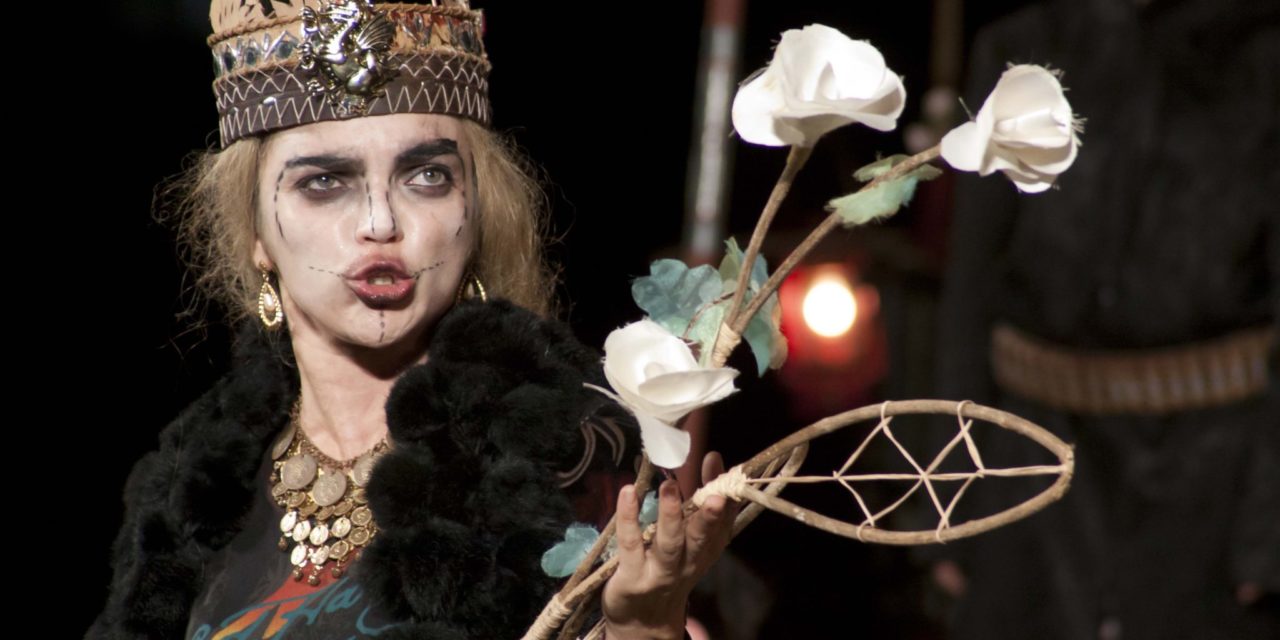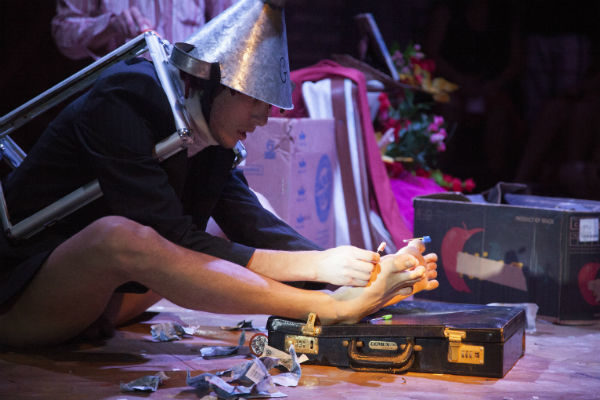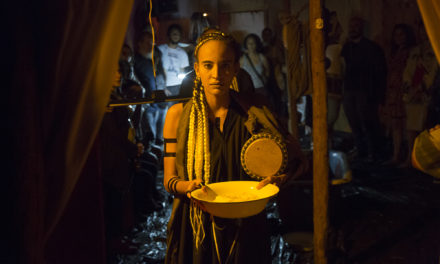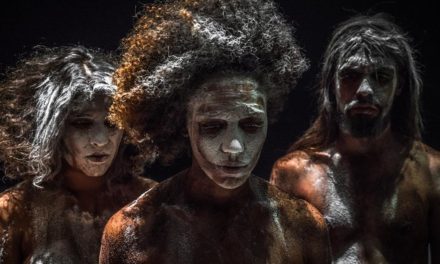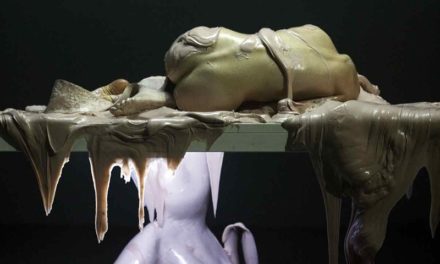I was born and currently live in Natal, the capital of Rio Grande do Norte, one of the states of Brazil, better known for tourism and beautiful beaches. It is not a rich state. On the contrary, today we are going through difficult moments as Brazil as a whole faces a serious political and economic crisis, which reminds me of the importance of art and theater as a questioner of the situation and a driver for change. Broadening this perspective, with the world today being connected to technology and the virtual world, and with so much information available on the Internet, it is intriguing to think that theater is a face-to-face experience that often occurs with limited resources, which is the case in my city.
The difficulties we face in Brazil today make the lives of those who work with theater even more difficult. In Natal, resources are very slim. The City and State Government haven’t been helping much, and there are very few alternatives for raising money for supporting these professionals. The most well-organized movements in the artistic field always strive for better cultural policies. Our greatest hope is the Federal Government, which faces a critical moment nowadays with limited investments.
Generally speaking, in Brazil, public funding for cultural projects comes from tax deductions or public notices. In the case of tax deductions, companies have the option of not paying part of the taxes and diverting the money for investments in cultural projects. In this way, they can choose the project they wish to invest on. This is a complaint of the theatrical community, because it ends up that the entrepreneur decides on what to invest money that is essentially public. And this decision is often based more on conveniences and marketing justifications rather than on concerns or willingness to invest in projects of greater relevance to our social context or with more sensitive and challenging themes.
Regarding Public Notices, the Government, as well as public and private companies, open selection for project financing, generally meaning limited resources and huge demand.
Apart from these options, artists need to support themselves by selling tickets and productions or investing in pedagogical projects in the field in addition to working in other areas.
As it turns out, the fight to bring more attention to theater issues, as well as the creation of an audience that will attend theatres, depends on Education. The inclusion of theatre studies in the school curriculum is a recent step. Children who learn the basics of the theater in school or who regularly watch theater productions have very good chances of becoming adults with critical thinking who can appreciate the theatre. There are, however, many older generations who resist this artistic expression. The search for an audience is a struggle that we will face for generations to come in Brazil if we take into account our poor educational history. If larger cities like São Paulo and Rio de Janeiro face this reality, what to expect from smaller cities like Natal?
The reality and practice I talk about in this article is the point of view of someone whose experience has occurred in theater collectives, which in Brazil is a popular form of theater. The basic idea is that of a group of people who come together for continued work and research in theater.
In Brazil, during the 70’s and the 80’s, collectives were the primary spaces to learn theatre, in the face of the few school available. Moreover, collectives played a strong role of political contestation in the face of the military dictatorship installed in the country. Over time, especially with the process of democratization, this political ideal also came together with the very idea of artistic production and the maintenance of groups. Perhaps because of its contentious origin, collective theater has in general been responsible for the best theatre productions in the country. It is important to say that these are productions often with limited resources, but of recognized innovation and quality. And in most cases, this is partially due to group theater focus on artistic research, showing the result of vertical processes with ongoing discussions of the topics covered, as well as extensive debate and appropriation of new techniques in each job.
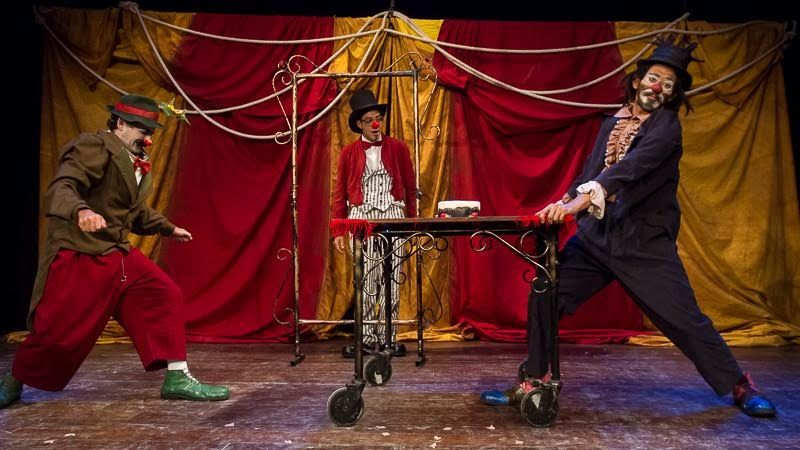
A lenda do trapezista cego. Photo: Mauricio Cuca.
Theater collectives are about a way of working in which members are all on the same level. Although in practice, such idea is not implemented entirely, since some people inevitably end up taking a role of leadership. These experiences are in essence far from assemblies in which a clearly said producer rules and is only followed by others in a relationship of subordination.
Although this text seems to summarize the situation of the collectives indicating points that may be found in all these artistic agglomerations, what we notice the most today is that the collective theater experience has its singularities on a per case basis. Much has been said of many possible ways in which theater collectives are organized, perhaps as a result of discussions on the issue and the maturity of this way of doing theater.
In Brazil, although it is not possible to indicate exactly the number of theater collectives, it is a fact that they exist throughout the country, with a great variety of lines of study, management styles, time of existence and mode of maintenance. I notice these differences among the collectives in my city, where I had the opportunity to be part of a few groups. We have younger groups, with an entrepreneurial spirit and its proper place; others are connected to the Federal University, and some have already accumulated many years of career and a national reputation. Some are still active, and others are not.
Albeit Natal is not located in a large cultural center, we have collectives that agitate the cultural scene of the city, either by presenting their productions or by using their venues for the presentation of collectives and artists from other cities.
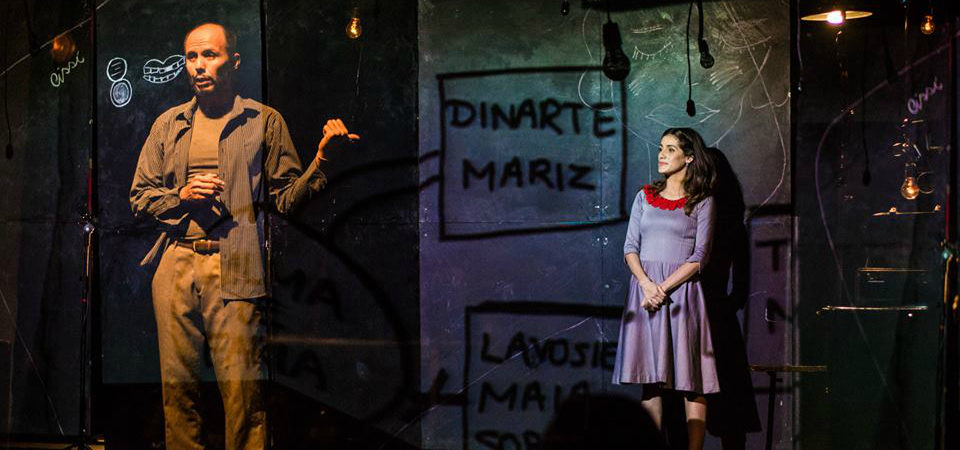
Jacy. Photo: Vlademir Alexandre.
An experience that represented a significant advance in the history of theater groups in Natal was the exchange with professionals from major cities. For example, Sua Incelença, Ricardo III (Your “Incelença” Richard III) (2010), by Clowns de Shakespeare, was directed by famous Gabriel Villela, Retrato do artista quando coisa (Portrait of The Artist as Thing) (2012), by Bololô Cia. Cênica, was directed by Luna Lunera, a theatre group from Belo Horizonte, Jacy (2013), by Teatro Carmin, had the consultancy of Márcio Abreu, director of Companhia Brasileira de Teatro from Curitiba, and A lenda do trapezista cego (The Legend of the Blind Trapeze Artist) (2014), by Cia. Tropa Trupe, was directed by Argentinean Walter Velázquez.
This practice was made possible by a cultural policy of federal governments started in the first decade of the 21st century and with a left-wing position which sent the announcement of public notices and investments throughout the country. This measure made it possible for the groups to use resources in an unprecedented way to set up their assemblies and to enable the arrival of these professionals from abroad.
These funds allowed collectives to invest in their scenic research and also enabled them to travel around the country, intensifying the exchange with other collectives and encouraging spectators. As a result, productions from Natal were showed regularly in big capitals, exposing to audiences of such places what we had been working on here. The same happened with the several seasons of Clowns de Shakespeare and the recent season of Teatro Carmin (Jacy) in São Paulo, the major cultural center of the country.
Although the current economic and political crisis already represents a decrease in investments, all the changes that we went through and this new scenario set a mark that does not allow us to settle for less anymore. Daily struggles seem to be commonplace to theater collectives.
George Holanda is an actor and a master’s degree student at the Federal University of Rio Grande do Norte, he has worked with several artistic nuclei of Natal and develops research on clown performance. He is also a member of Farofa Crítica, a theater criticism collective.
This post was written by the author in their personal capacity.The opinions expressed in this article are the author’s own and do not reflect the view of The Theatre Times, their staff or collaborators.
This post was written by George Holanda.
The views expressed here belong to the author and do not necessarily reflect our views and opinions.

